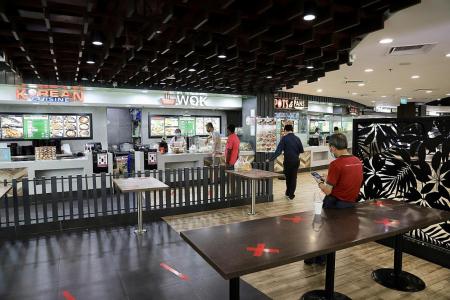To avoid Covid-19 spike, dining at F&B outlets not possible in phase one: Gan Kim Yong
Some restaurant owners asking for restrictions to be eased, but Minister warns of potential spike in cases
It will not be possible to allow dining-in at food and beverage (F&B) outlets in the first phase of Singapore's reopening after the circuit breaker, Health Minister Gan Kim Yong said yesterday.
Doing so would lead to a "general opening up of society" and could cause a spike in coronavirus cases, he noted, forcing the country to reinstate safe distancing measures.
"When you allow gatherings in F&B outlets, it means you must also allow gatherings outside (this setting)," Mr Gan told Parliament. "It doesn't make sense to allow only F&B gatherings."
He was responding to Mr Lim Biow Chuan (Mountbatten), who said many F&B outlet owners are asking for restrictions to be eased earlier, as they may not be able to keep their businesses afloat until Phase Two begins.
Mr Lim suggested allowing dining-in, as long as customers are spaced out at a safe distance.
Mr Gan replied the multi-ministry task force he co-chairs has discussed the issue at length. He acknowledged that while many F&B outlets are allowed to deliver food and sustain a basic level of business, it is "not enough". There are also outlets that cannot do delivery as it is not economical.
However, the task force concluded Singapore has to take a more cautious approach in the first phase of its reopening.
"We are not prepared to open up too early, too quickly, because that may result in more cases emerging and, in turn, will require us to reimpose some measures, and as a result defer and slow down Phase Two."
Mr Gan urged Singaporeans to be patient and press on with their efforts to keep community transmission of the virus low.
"We understand the anxiety our people are facing, and are acutely aware of the economic and social impact of prolonged closure of various sectors," he said. "All of us want to get back to normal as soon as possible, and be able to see our friends and family members whom we have not seen for some time."
Mr Murali Pillai (Bukit Batok) asked about the merits of easing circuit breaker measures now, given the daily number of new Covid-19 cases in foreign worker dormitories remains in the hundreds. He also asked how infection would be contained within the dormitories.
The situation in the dormitories is now under control, Mr Gan replied, adding: "The time has come to... resume activities, gradually and cautiously."
Although the number of cases found among the migrant worker population may remain high for some time, some may be indicative of past infections rather than active cases, he added.
Among the wider community, the number of Covid-19 cases has dropped from a daily average of 31 at the start of the circuit breaker, to four in the past week.
"As restrictions are eased and more activities resume, it becomes even more critical that each of us exercises strong social responsibility," Mr Gan said.
"We need everyone to play his part. Wear a mask when outside your home, maintain good personal hygiene and observe safe opening measures."
Get The New Paper on your phone with the free TNP app. Download from the Apple App Store or Google Play Store now


